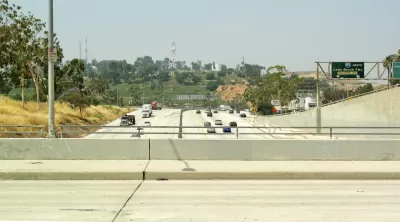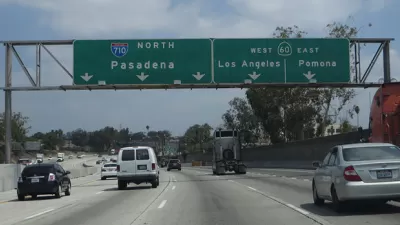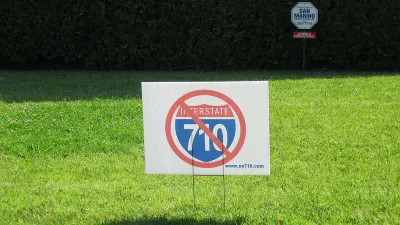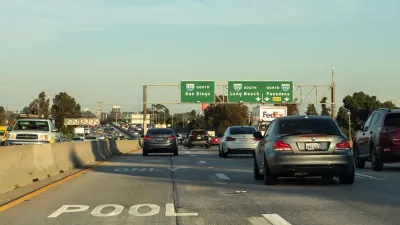Communities along the corridor have fought expansion for decades, citing air quality and displacement concerns. Now, the agency says it's time to rethink the project.

After decades of controversy, the head of California's department of transportation (Caltrans) called for "an absolute pause" on plans to widen the 710 Freeway through southeast Los Angeles County, reports Joe Linton for Streetsblog LA. "This year, the federal Environmental Protection Agency rejected Metro’s 710 plans because they didn’t comply with air pollution laws," and community activists have long spoken out against the harmful effects of pollution and displacement on neighboring communities.
According to Caltrans head Toks Omishakin, "this is not just an air quality issue that we’re facing on this project. The [Environmental Justice] issues – potential relocations – to me, are just as potentially problematic." Toks added, "I don’t see how we can move forward with this project in its current format."
Metro, the other partner in the project, "hasn’t yet publicly backed off from the current proposed expansion." Los Angeles County Supervisor Janice Hahn acknowledged the impacts of the freeway on public health, saying "[t]he communities along the 710 have been burdened by pollution for decades and the residents have higher rates of asthma, cancer, and other serious health conditions. We shouldn’t burden these families with more pollution." But she didn't reject the expansion altogether, saying adding, "any new lanes added to the 710 would only be for zero emissions cars and trucks."
East Yards Communities for Environmental Justice Co-Executive Director Laura Cortez praised Omishakin's statement: "Caltrans stopping this iteration of the 710 project is a huge win for communities along the corridor. We continue to look to Metro to agree with stopping the current 710 project and co-lead a plan forward with community that is truly zero-emissions focused."
FULL STORY: Head of Caltrans Says Time to Pause Current 710 Freeway Expansion

Planetizen Federal Action Tracker
A weekly monitor of how Trump’s orders and actions are impacting planners and planning in America.

Restaurant Patios Were a Pandemic Win — Why Were They so Hard to Keep?
Social distancing requirements and changes in travel patterns prompted cities to pilot new uses for street and sidewalk space. Then it got complicated.

Map: Where Senate Republicans Want to Sell Your Public Lands
For public land advocates, the Senate Republicans’ proposal to sell millions of acres of public land in the West is “the biggest fight of their careers.”

Orange County, Florida Adopts Largest US “Sprawl Repair” Code
The ‘Orange Code’ seeks to rectify decades of sprawl-inducing, car-oriented development.

Maui's Vacation Rental Debate Turns Ugly
Verbal attacks, misinformation campaigns and fistfights plague a high-stakes debate to convert thousands of vacation rentals into long-term housing.

San Francisco Suspends Traffic Calming Amidst Record Deaths
Citing “a challenging fiscal landscape,” the city will cease the program on the heels of 42 traffic deaths, including 24 pedestrians.
Urban Design for Planners 1: Software Tools
This six-course series explores essential urban design concepts using open source software and equips planners with the tools they need to participate fully in the urban design process.
Planning for Universal Design
Learn the tools for implementing Universal Design in planning regulations.
Heyer Gruel & Associates PA
JM Goldson LLC
Custer County Colorado
City of Camden Redevelopment Agency
City of Astoria
Transportation Research & Education Center (TREC) at Portland State University
Camden Redevelopment Agency
City of Claremont
Municipality of Princeton (NJ)





























